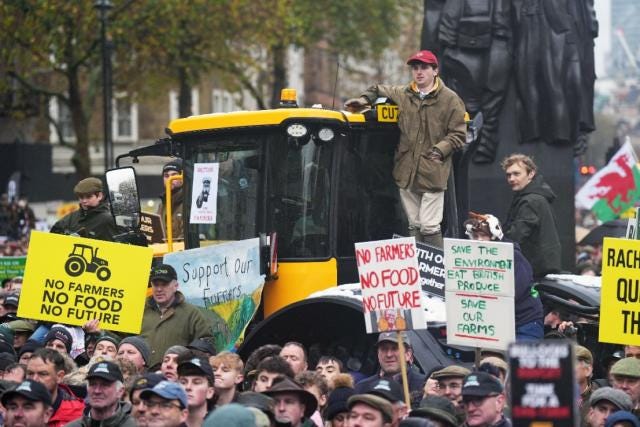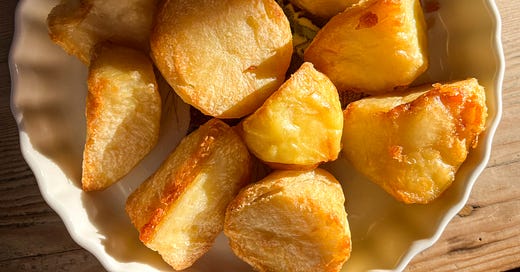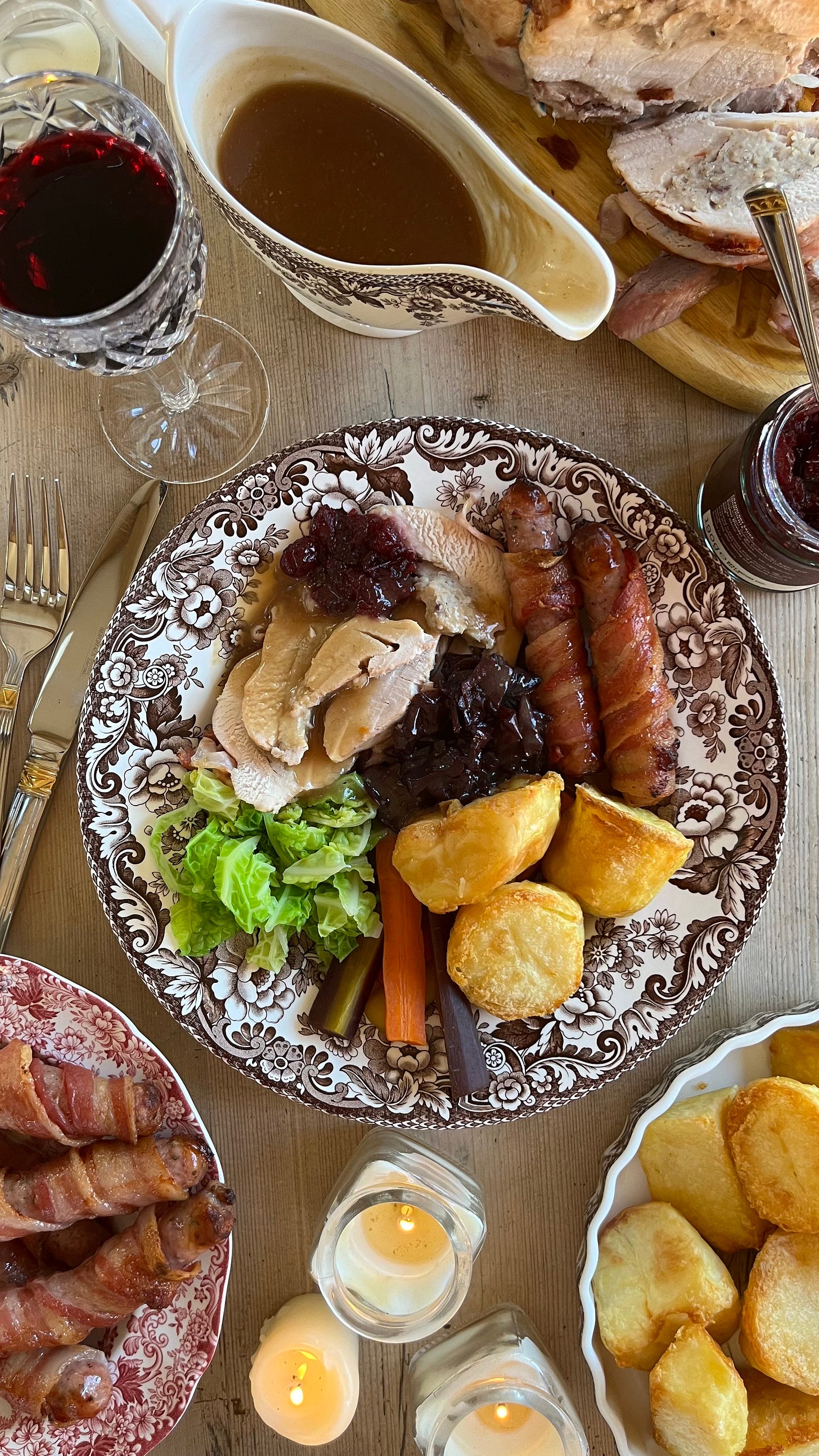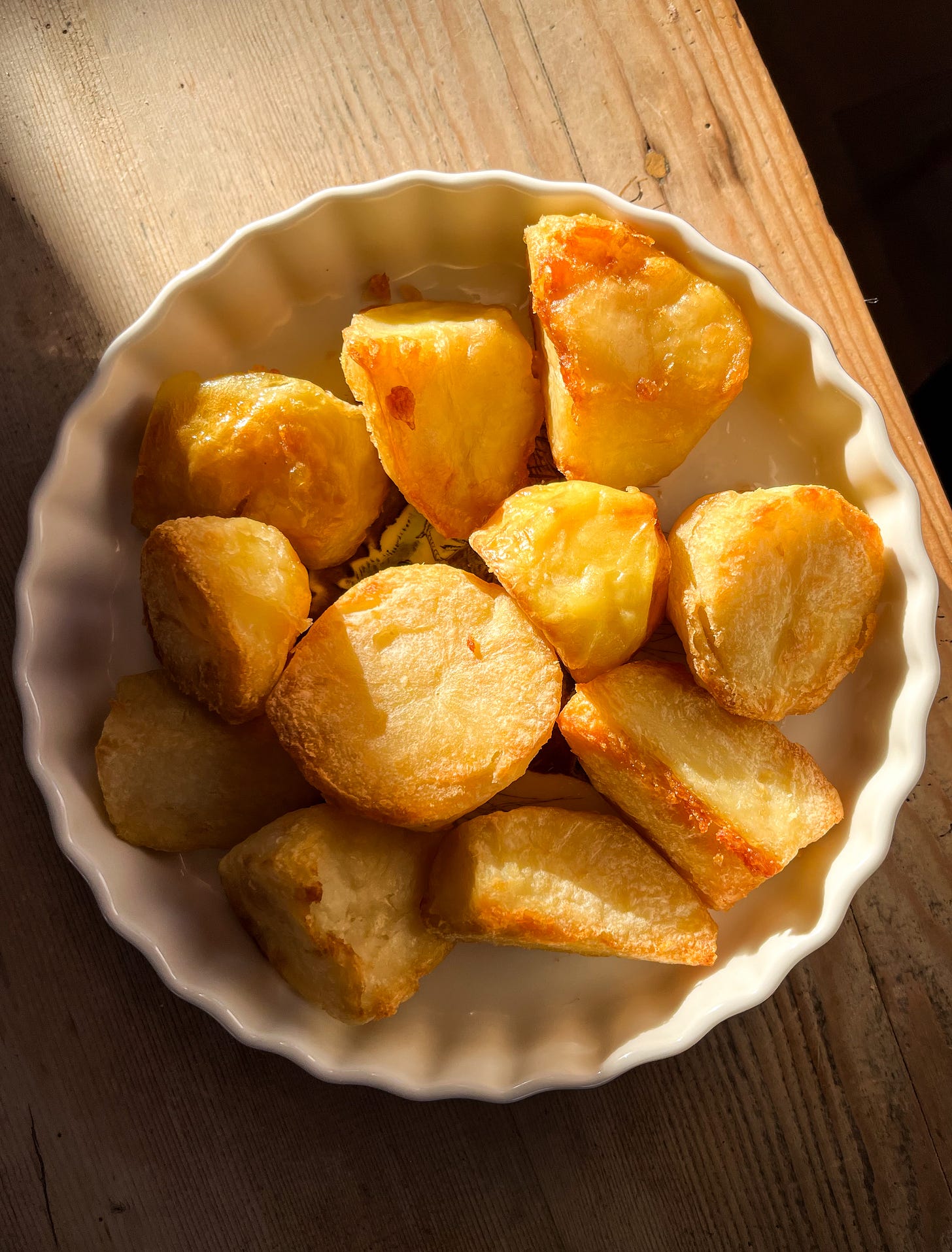How To Make Excellent Roast Potatoes.
And why it is more important than ever to #BackBritishFarming
Ostensibly today I’m going to talk to you today about how to make the perfect roast potatoes (or at least my version of the perfect roast potato) as I made an early Christmas lunch yesterday this week filming a thing as part of my ongoing partnership with online butcher Field and Flower.
They’re great potatoes - a foolproof method that works with many different cooking fats (goose - as pictured above, beef, olive oil, infused oils, vegetable shortening) - but what I actually love about them the most is that I buy them in sacks from a family farm near my parents house. Good, delicious British potatoes that #BackBritishFarming.
Now, I know from my stats dashboard that a very large chunk of ingredient readers are American (47%, how did that happen to an unashamedly British food writer?), so you might not know why that hashtag, along with #StopTheFamilyFarmTax is so important right now; but from reading plenty of different views from across the political spectrum across the pond over the past few months, I know a lot of you might understand the feelings of anger and helplessness that your government is intent on attacking and dismantling your way of life.


A summary, which I think is important for my British readers too: in last month’s budget, the newly elected Labour government announced changes to agricultural and business property tax relief. In short, on top of massive tax rises all businesses in Britain will have to pay with a rise in employer national insurance (a tax businesses pay per employee to help fund social benefits like state pensions and healthcare) family farms over £1 million in value will start having to pay inheritance tax (for those of you who live in countries where this concept sounds alien, yes our government taxes the grieving beneficiaries of a loved ones will for daring to inherit anything over a certain threshold). Ostensibly, the reasoning behind this change is that the government wants to close a tax loophole; they claim that this new tax will only hit the super wealthy who buy up farmland to attempt to avoid inheritance tax and that the percentage of family farms that will be impacted will be negligible.
However, farmers, their accountants, farming groups and the National Farmers Union beg to differ. Farm land is exceptionally valuable because of what other purposes it could be put to (housing development, for example) and as anyone who has ever watched Clarkson’s Farm will know, farm equipment can be shockingly expensive. In some cases, investment over generations of land stewardship can yield as little as a 1% financial return. The truth is that for many different reasons - including poor past policy decisions, a broken food system where we think a whole chicken in a supermarket should cost £4 not £20, and even something as simple as poor weather - British farmers may be asset rich (in a way that triggers these new tax changes), but in many cases they are exceptionally cash poor. These new changes will leave many farmers, still in lots of cases working the land well into their eighties, unable to pass on their family farms as their children, often working alongside them will be unable to settle the coming bill without selling off the parts of the farm that make them (only just) viable. This can’t be undone: our countryside and rural way of life will fundamentally be changed by this land being given over to yet more housing development (we need more affordable houses, but not on the land we need to feed us) or foreign-owned super farms which are likely to have lower standards of animal welfare.
The breakup of the family farms that feed us will also have fundamental, potentially terrifying implications for our future food security if we become increasingly dependent on foreign imports to feed ourselves. We already import almost half of our food, and roughly a quarter of that comes through the port and cross-channel train here in Kent. Anyone who lives here knows how easily the M20, the main (and for big lorries in this rural setting sometimes the only suitable) road linking us to the rest of the country can be gridlocked either by bad weather stopping the boats crossing the English Channel, the French going on strike, or simply by too many people trying to drive to Europe on holiday at once. Do we really want even more of our food stuck in traffic coming from the continent?

For a rural community like ours, this is not just about the farmers and producers (because living in Kent where we produce some of the best English wine in the country, growers matter too) who work the land to produce the food and drink consumed by those of us who do our best to Buy British. It’s about the people who sell the produce working in local farm shops, the workers who build agricultural buildings, the butchers who process the meat, those in agricultural maintenance, and others who live in communities like ours who do jobs that simply would not exist without local farmers. The campaign slogan on so many banners on the farmers protest march against these changes in Westminster on Tuesday rings true: No Farmers, No Food, No Future.
Shall we get back to these potatoes? As I mentioned I made them as part of a festive spread for online butchers Field and Flower who I love because buying hyper-local is not always easy or practical (and that’s here in the countryside, it’s even harder if you live in a town or a city), so it’s a great way of getting free-range, grass-fed British meat delivered directly to your door, supporting independent British farmers. Last orders for Christmas are on 13th December, and if you use the discount code in my video (an exceptionally rare example of me actually on camera!) you’ll also get £15 off!
Cooking Perfect Roast Potatoes Without A Recipe
I know the internet hates it when people post ‘recipes’ without a typed out ‘recipe’, but that is not how you get roast potatoes to work every time. You don’t make roast potatoes to eat by themselves, you’re making them to go with a Sunday roast, so you’ll need them to work in the same oven as your chicken / pork / lamb / beef / duck / goose / other smaller game bird, which will never be the same weight and therefore require an identical cooking time each time.
You’ll want to start with good, British (or local if you’re not British, obviously) white potatoes, to peel them, and depending on your size of whole potato, cut them into 2-4 roast potato sized chunks. J and I are a bit obsessive about our roast potatoes so we have 4 each; 3 is a more typical serving size, and you can get away with 2 if there are plenty more sides.
Big saucepan of cold, very well salted water. Bring to the boil, and cook until you can *only just* get a fork in the middle of the biggest potato. If you’re doing roast parsnips, throw them into the pot too.
Drain, and allow to sit for 5 minutes to drain a bit more. Season the hell out of them with salt.
To prepare the cooking fat, pour it or spoon it into the bottom of a roasting dish just big enough for them to sit in a single layer. You want just about 1 cm of fat across the bottom. I use light olive oil for every day, goose or duck fat for special occasions, and a 50/50 blend of light olive oil and Pomora’s excellent rosemary-infused extra virgin olive oil (gifted, but much loved) when I’m doing lamb, which is a pricy but exceptional way to do your potatoes.
Heat the fat for 20 minutes before you want to add the potatoes at any temperature your oven needs to be at from 160C upwards.
Add the potatoes to the sizzling fat, turning them over with your tongs so they’re well coated. Then, roast them in the oven alongside whatever else you’ve got in there.
As for timings, as a general rule good roast potatoes want at least an hour. I let them roast with my meat for an hour at 160C, turning them about halfway when the tops and the potatoes around the edge start to get golden, and then once the roast is out and resting (15 minutes for a chicken, 30 minutes for a joint of beef or pork, 45 minutes for a turkey), I turn the temperature up to 200C to blast them and get a good amount of golden crispiness on them, if they need it. If I’m doing a bigger roast, so I’ve got a good hour and a half of available oven time for the potatoes, sometimes I don’t need that final blast, so I just leave them in at the same temperature during the resting time.
If you’ve screwed up and they’re ready before the meat is, take them out of the fat and transfer them to an oven-proof dish before returning them to the oven for up to 30 minutes. They won’t burn as they’re out of the fat, but will stay nice and crunchy.
Don’t try and reinvent the wheel, or stress about the potatoes. Just like my method for making perfect Yorkshire puddings, let them flex to the meat you’re roasting, which is the part of the roast where the exact cooking times and temperatures matter the most.
Perfect roast potatoes are roast potatoes that work with whatever cooking fat you have to hand, and which don’t mean you have to ruin the cooking times of the rest of your meal. But most importantly, the perfect roast potatoes are local roast potatoes, grown by members of your community, who have been paid a fair price.







I agree, farmers need all the support they can get.
Brilliantly said! Farmers have always supported us. Now we need to support them.